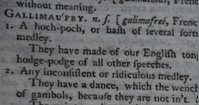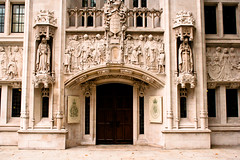Better angels, undesirable devils, and the judicial pay amendment
 Earlier this evening, I did an interview on The Last Word with Matt Cooper on Today fm concerning next Thursday’s referendum to amend the Constitution to add a mechanism to allow judges’ salaries to be reduced. The arguments in favour of the principle are very strong: as a matter of fairness and balance, when other public servants are suffering pay reductions, there is no good reason why judges should not do so too. But that is not the only principle at stake here: the independence of the judiciary is an important aspect of the rule of law. Any implementation of the principle of reduction in judicial salaries in line with other public servants ought to be done without doing violence to the principle of the independence of the judiciary. As I said on The Last Word with Matt Cooper this evening, I do not believe that the proposed amendment manages to maintain this balance.
Earlier this evening, I did an interview on The Last Word with Matt Cooper on Today fm concerning next Thursday’s referendum to amend the Constitution to add a mechanism to allow judges’ salaries to be reduced. The arguments in favour of the principle are very strong: as a matter of fairness and balance, when other public servants are suffering pay reductions, there is no good reason why judges should not do so too. But that is not the only principle at stake here: the independence of the judiciary is an important aspect of the rule of law. Any implementation of the principle of reduction in judicial salaries in line with other public servants ought to be done without doing violence to the principle of the independence of the judiciary. As I said on The Last Word with Matt Cooper this evening, I do not believe that the proposed amendment manages to maintain this balance.
The amendment proposes that “provision may … made by law to make proportionate reductions to the remuneration of judges” in certain circumstances. Leaving aside those circumstances, this simply allows the reduction of judicial salaries to be effected by legislation, which in the ordinary way is proposed by Government.…






